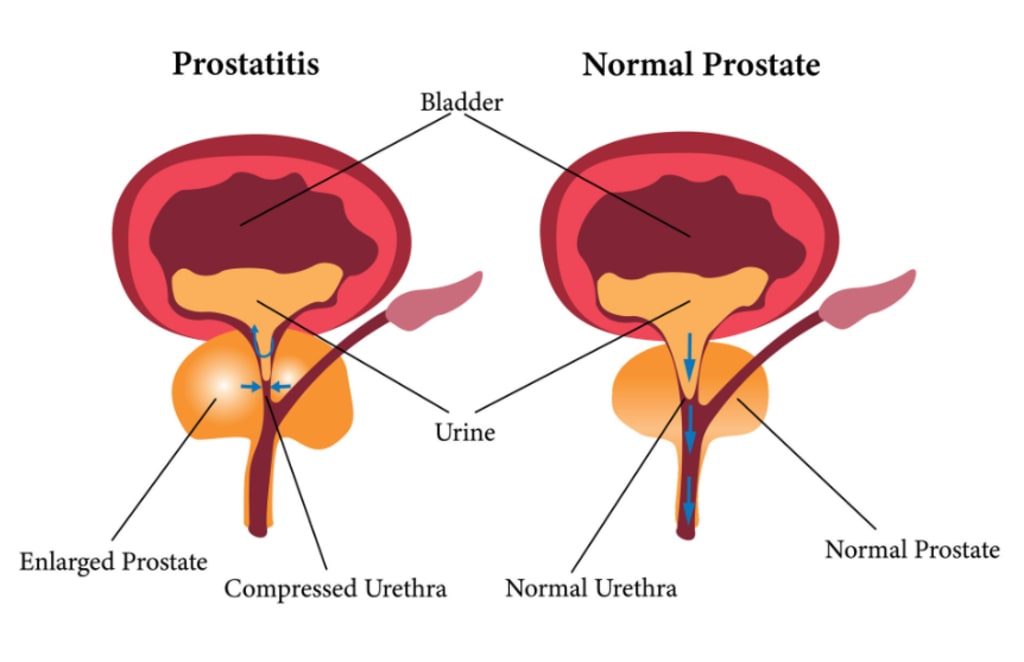How do you know if your prostate is healthy
Food to avoid for prostate health

## How to Keep a Healthy Prostate: A Comprehensive Guide
Maintaining a healthy prostate is crucial for men, particularly as they age. The prostate gland, although small, plays a significant role in male reproductive health and can influence overall well-being. Understanding how to care for your prostate can help prevent common issues like benign prostatic hyperplasia (BPH), prostatitis, and even prostate cancer. Here’s a detailed guide on how to keep your prostate in top shape.
### Understanding the Prostate
The prostate is a walnut-sized gland located just below the bladder and in front of the rectum. It surrounds part of the urethra, the tube that carries urine from the bladder out through the penis. The primary function of the prostate is to produce seminal fluid, which nourishes and transports sperm during ejaculation.
### Key Tips for Maintaining Prostate Health
1. **Adopt a Healthy Diet**
- **Eat Plenty of Fruits and Vegetables**: These are rich in antioxidants and anti-inflammatory compounds. Tomatoes, in particular, are high in lycopene, which has been linked to reduced prostate cancer risk.
- **Include Healthy Fats**: Omega-3 fatty acids found in fish like salmon and flaxseeds can reduce inflammation and support prostate health.
- **Limit Red Meat and Processed Foods**: High consumption of red meat and processed foods is associated with a higher risk of prostate problems. Opt for lean proteins like chicken, turkey, or plant-based proteins instead.
- **Drink Green Tea**: Green tea is rich in antioxidants known as catechins, which may help protect against prostate cancer.
2. **Maintain a Healthy Weight**
- Being overweight or obese is linked to an increased risk of prostate issues, including BPH and prostate cancer. Engage in regular physical activity and follow a balanced diet to manage your weight effectively.
3. **Stay Physically Active**
- Regular exercise can reduce inflammation, improve immune function, and help maintain a healthy weight, all of which are beneficial for prostate health. Aim for at least 150 minutes of moderate aerobic exercise, like walking or swimming, every week.
4. **Regular Screenings and Check-ups**
- Prostate-specific antigen (PSA) tests and digital rectal exams (DRE) are crucial for early detection of prostate issues. Men over 50, or earlier for those with a family history, should discuss screening options with their healthcare provider.
5. **Stay Hydrated**
- Drinking plenty of water is essential for overall health and helps maintain urinary function. Aim for at least 8 glasses of water a day to keep your urinary system, including your prostate, in good working order.
6. **Avoid Smoking and Limit Alcohol Intake**
- Smoking and excessive alcohol consumption can negatively impact prostate health. Quitting smoking and moderating alcohol intake can lower the risk of prostate problems.
7. **Practice Safe Sexual Health**
- Regular ejaculation has been linked to a lower risk of prostate cancer. Maintaining a healthy and safe sexual life can contribute to overall prostate health.
8. **Manage Stress**
- Chronic stress can lead to elevated levels of cortisol, which may negatively impact prostate health. Techniques like meditation, yoga, and deep-breathing exercises can help manage stress effectively.
9. **Consider Supplements with Caution**
- Supplements like saw palmetto, zinc, and selenium have been associated with prostate health, but it's essential to consult with a healthcare provider before starting any supplement regimen to avoid adverse effects.
10. **Educate Yourself and Stay Informed**
- Being aware of the latest research and recommendations for prostate health can help you make informed decisions. Participate in health workshops, read up-to-date articles, and engage with your healthcare provider about any concerns.
### Common Prostate Health Issues
1. **Benign Prostatic Hyperplasia (BPH)**
- BPH is a non-cancerous enlargement of the prostate that can cause urinary symptoms. Lifestyle changes, medications, and sometimes surgery are used to manage BPH.
2. **Prostatitis**
- This inflammation of the prostate can be bacterial or non-bacterial and can cause pain, urinary difficulties, and sexual dysfunction. Treatment often involves antibiotics for bacterial prostatitis and lifestyle changes for non-bacterial forms.
3. **Prostate Cancer**
- Prostate cancer is one of the most common cancers among men. Early detection through screenings can lead to effective treatment. Treatment options range from active surveillance for low-risk cancer to surgery, radiation, and hormone therapy for more aggressive forms.
### Conclusion
Taking proactive steps towards maintaining a healthy prostate is essential for long-term well-being. A balanced diet, regular exercise, and routine medical check-ups form the cornerstone of good prostate health. By adopting these habits, you can significantly reduce the risk of prostate issues and enjoy a healthier life.
## Foods to Avoid for Optimal Prostate Health
Maintaining a healthy prostate is a crucial aspect of overall well-being for men, especially as they age. While incorporating certain foods into your diet can support prostate health, it’s equally important to be aware of foods that might have adverse effects. Understanding what to avoid can help you take proactive steps towards preventing common prostate issues like benign prostatic hyperplasia (BPH), prostatitis, and prostate cancer. Here's a guide on foods to limit or avoid to keep your prostate in top shape.
### Foods to Avoid
1. **Red and Processed Meats**
- **Why Avoid?**: Studies have shown a correlation between high consumption of red meats (like beef, pork, and lamb) and processed meats (such as bacon, sausages, and hot dogs) with an increased risk of prostate cancer and other prostate-related problems. These meats can contain high levels of saturated fats and compounds formed during high-temperature cooking, which may promote inflammation and oxidative stress.
- **Alternative**: Opt for lean proteins like chicken, turkey, or plant-based sources such as beans, lentils, and tofu. Fish, rich in omega-3 fatty acids, is also a great alternative.
2. **Dairy Products**
- **Why Avoid?**: High consumption of dairy products, including milk, cheese, and butter, has been associated with an elevated risk of prostate cancer. Dairy products are often high in saturated fats and calcium, which can influence hormone levels and possibly promote prostate cancer cell growth.
- **Alternative**: Try plant-based milk alternatives like almond, soy, or oat milk, and choose dairy-free options for cheeses and yogurts. Incorporate calcium-rich non-dairy foods like leafy greens, almonds, and fortified plant milks into your diet.
3. **Sugary Foods and Beverages**
- **Why Avoid?**: Foods and drinks high in sugar can lead to weight gain and obesity, which are risk factors for prostate issues. High sugar intake can also cause insulin resistance and chronic inflammation, both of which can negatively impact prostate health.
- **Alternative**: Satisfy your sweet tooth with natural sources of sweetness such as fruits. Choose whole fruits over fruit juices and limit your intake of sugary snacks and desserts. Water and herbal teas are great beverage choices.
4. **Alcohol**
- **Why Avoid?**: Excessive alcohol consumption can irritate the bladder and urinary tract, exacerbating symptoms of BPH and increasing the risk of prostate cancer. Alcohol can also contribute to dehydration and disrupt hormone balance.
- **Alternative**: Limit alcohol intake to moderate levels—up to one drink per day for men. Opt for non-alcoholic beverages like sparkling water, herbal teas, or kombucha.
5. **Caffeine**
- **Why Avoid?**: Caffeine can irritate the bladder and worsen urinary symptoms associated with an enlarged prostate. It may also lead to dehydration and increase the frequency of urination.
- **Alternative**: Reduce your intake of caffeinated beverages like coffee, tea, and sodas. Choose decaffeinated versions or herbal teas to reduce your caffeine consumption.
6. **Trans Fats and Hydrogenated Oils**
- **Why Avoid?**: Trans fats, commonly found in processed and packaged foods like baked goods, snacks, and fried items, can increase inflammation and are linked to numerous health issues, including prostate problems.
- **Alternative**: Read food labels to avoid products with partially hydrogenated oils. Use healthier fats like olive oil, avocado oil, and nuts in your cooking and snacks.
7. **High-Sodium Foods**
- **Why Avoid?**: A diet high in salt can lead to hypertension and exacerbate urinary symptoms in men with BPH. Processed and fast foods are often high in sodium.
- **Alternative**: Limit your intake of processed and packaged foods, and season your meals with herbs and spices instead of salt. Cook more meals at home where you can control the amount of salt used.
### General Tips for a Prostate-Friendly Diet
1. **Focus on Plant-Based Foods**
- A diet rich in fruits, vegetables, whole grains, nuts, and seeds provides essential nutrients and antioxidants that support prostate health and overall well-being.
2. **Incorporate Healthy Fats**
- Include sources of omega-3 fatty acids, such as salmon, flaxseeds, and chia seeds, which have anti-inflammatory properties beneficial for prostate health.
3. **Stay Hydrated**
- Drink plenty of water throughout the day to support urinary function and overall health.
4. **Moderation is Key**
- While it’s important to avoid certain foods, balance and moderation in your diet are crucial. Occasional indulgence is fine as part of a healthy, varied diet.
5. **Consult with a Healthcare Provider**
- Before making significant dietary changes, especially if you have existing health conditions, consult with a healthcare professional or a registered dietitian.
### Conclusion
Being mindful of the foods you consume is a powerful way to support prostate health and reduce the risk of common prostate issues. By avoiding or limiting red and processed meats, dairy, sugary foods, alcohol, caffeine, trans fats, and high-sodium foods, you can create a diet that promotes prostate wellness and overall health.Prostadine Reviews
Making these changes may seem challenging, but even small steps can lead to significant improvements. Combine these dietary practices with regular physical activity and routine health check-ups to maintain optimal prostate health.
About the Creator
peter
Content about cars, motorbikes, technology, news
Enjoyed the story? Support the Creator.
Subscribe for free to receive all their stories in your feed. You could also pledge your support or give them a one-off tip, letting them know you appreciate their work.






Comments
There are no comments for this story
Be the first to respond and start the conversation.